| Listing 1 - 10 of 12 | << page >> |
Sort by
|
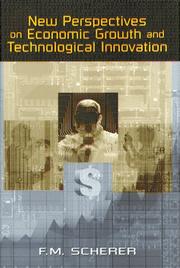
ISBN: 0815777949 0815796536 0815777957 9780815777953 9780815777946 Year: 1999 Publisher: Washington, D.C.: Brookings Institution,
Abstract | Keywords | Export | Availability | Bookmark
 Loading...
Loading...Choose an application
- Reference Manager
- EndNote
- RefWorks (Direct export to RefWorks)
A Brookings Institution Press and British-North American Committee publication Two hundred years ago, the first Industrial Revolution sparked a dramatic acceleration in the quantity of goods and services available to the average citizen--a trend of steadily increasing real income per capita that continues to this day. Since that time, economists have struggled to develop systematic explanations for what caused the sudden, rapid increase, why the economy keeps growing, and why the rate of growth varies in different time periods and nations. In this book, F. M. Scherer traces the evolution of economic growth theory from the Industrial Revolution to the present. Emphasizing technological change as the most crucial dynamic force for growth, Scherer analyzes early hypotheses that paid little attention to new technologies, follows the emergence of theories that increasingly emphasized technological change, and reviews the current state of economic growth theory. Pointing out a lack of solid microbehavioral foundations to support contemporary "new growth" ideas, Scherer then supplies some foundational "bricks" concerning financial investment and human capital, and concludes by exploring the prospects for sustaining rapid growth into the next century.
Economic growth --- Economic production --- Economic development --- Technological innovations --- History --- Economic aspects --- History. --- Economic development - History --- Technological innovations - Economic aspects - History
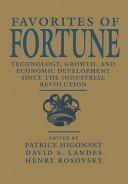
ISBN: 067429520X Year: 1991 Publisher: Cambridge, Mass. London Harvard University Press
Abstract | Keywords | Export | Availability | Bookmark
 Loading...
Loading...Choose an application
- Reference Manager
- EndNote
- RefWorks (Direct export to RefWorks)
Economic history --- Economische geschiedenis --- Geschiedenis [Economische ] --- Histoire économique --- History [Economic ] --- Technological innovations --- Economic aspects --- History --- Industry --- Technological innovations - Economic aspects - History. --- Economic history. --- Industry - History.

ISBN: 019828327X Year: 1992 Publisher: Oxford New York Clarendon Press Oxford university Press
Abstract | Keywords | Export | Availability | Bookmark
 Loading...
Loading...Choose an application
- Reference Manager
- EndNote
- RefWorks (Direct export to RefWorks)
Industrial organization --- Technological innovations --- Industrie --- Innovations --- History --- Economic aspects --- Organisation, contrôle, etc --- Histoire --- Aspect économique --- Organisation, contrôle, etc --- Aspect économique --- Technological innovations - Economic aspects - History. --- Industrial organization - History. --- NOUVELLES TECHNOLOGIES --- INNOVATIONS --- HISTOIRE ECONOMIQUE --- ECONOMIE INDUSTRIELLE
Book
ISBN: 9782070762958 2070762955 Year: 2010 Publisher: Paris: Gallimard,
Abstract | Keywords | Export | Availability | Bookmark
 Loading...
Loading...Choose an application
- Reference Manager
- EndNote
- RefWorks (Direct export to RefWorks)
François Caron, un des meilleurs spécialistes français de l'histoire des techniques, reprend ici le problème classique de l'innovation en matière industrielle. Des bibliothèques entières ont été écrites sur le sujet. Non seulement l'auteur les domine, mais, au terme d'une longue expérience, il y apporte une subtile dialectique de la continuité et de la rupture. L'innovation répond à une demande de nature sociale, mais elle modifie en même temps l'ensemble des pratiques sociales. Le regard de François Caron couvre une vaste période. Après le temps des artisans vient celui des ingénieurs et des savants, jusqu'au moment où l'entreprise elle-même devient le laboratoire de l'innovation. Elle se fait alors le centre organisateur d'un système de réseaux, construits autour de relations d'affaires, de programmes de recherche et d'intérêts convergents. Ainsi apparaît une société maillée, qui se prolonge aujourd'hui dans l'Internet et les réseaux sociaux. Une des originalités de ce livre, appelé à devenir un classique, est de combiner une série d'analyses théoriques avec des synthèses ponctuelles sur de nombreux secteurs : mécanisation, machine à vapeur, thermodynamique, chemins de fer, industries chimique et électrique, technologies de la communication... Cette approche permet de prendre toute la mesure des mécanismes de la civilisation technicienne, la nôtre, qu'il nous est ainsi donné de mieux comprendre.
Technological innovations --- Innovations --- History. --- Economic aspects --- Social aspects --- History --- Histoire --- Aspect économique --- Aspect social --- Knowledge, Theory of --- Histoire des techniques --- --Innovation --- --Histoire économique et sociale --- --Europe --- --History --- Aspect économique --- Technological innovations - Europe - History --- Technological innovations - Economic aspects - History --- Technological innovations - Social aspects - History --- Technological innovations - History --- Knowledge, Theory of - History --- Innovation --- Histoire économique et sociale --- Europe --- Changement social --- Technique et civilisation
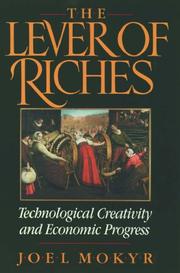
ISBN: 0195061136 0195074777 019985498X 0199762716 1283113341 9786613113344 019987946X 9780195061130 Year: 1990 Publisher: New York (N.Y.): Oxford university press,
Abstract | Keywords | Export | Availability | Bookmark
 Loading...
Loading...Choose an application
- Reference Manager
- EndNote
- RefWorks (Direct export to RefWorks)
In a world of supercomputers, genetic engineering, and fiber optics, technological creativity is ever more the key to economic success. But why are some nations more creative than others, and why do some highly innovative societies--such as ancient China, or Britain in the industrial revolution--pass into stagnation? Beginning with a fascinating, concise history of technological progress, Mokyr sets the background for his analysis by tracing the major inventions and innovations that have transformed society since ancient Greece and Rome. What emerges from this survey is often surprising: the c
World history --- Economic development --- Technological innovations --- Développement économique --- Innovations --- History --- Economic aspects --- Histoire --- Aspect économique --- History. --- -Technological innovations --- -Breakthroughs, Technological --- Innovations, Industrial --- Innovations, Technological --- Technical innovations --- Technological breakthroughs --- Technological change --- Creative ability in technology --- Inventions --- Domestication of technology --- Innovation relay centers --- Research, Industrial --- Technology transfer --- Development, Economic --- Economic growth --- Growth, Economic --- Economic policy --- Economics --- Statics and dynamics (Social sciences) --- Development economics --- Resource curse --- -History --- developpement economique --- histoire economique --- technologie --- economische ontwikkeling --- economische geschiedenis --- Développement économique --- Aspect économique --- Economic development -- History. --- Economic development. --- Technological innovations -- Economic aspects -- History. --- Technological innovations -- Economic aspects. --- Technological innovations. --- Breakthroughs, Technological --- Economic aspects&delete& --- Technological innovations - Economic aspects - History --- Economic development - History --- Créativité en technologie --- Technique --- Industrie --- Innovation --- Histoire économique. --- Histoire. --- Créativité en technologie --- Histoire économique.

ISBN: 0521613485 9780521613484 9780511752223 0511752229 9780521543538 Year: 2003 Volume: 12 Publisher: Cambridge: Cambridge university press,
Abstract | Keywords | Export | Availability | Bookmark
 Loading...
Loading...Choose an application
- Reference Manager
- EndNote
- RefWorks (Direct export to RefWorks)
All forms of popular protest include a specific category of 'popular intellectuals', who reflect on social reality, speak in the name of popular classes and who articulate ideas that inspire collective action. This volume focuses on these individuals from an original angle: it looks at the experiences of popular intellectuals in non-western societies, who operate within social-movement networks that link local, regional, and international arenas, and connect to a global flow of ideas. Eight case studies on different societies in twentieth-century Asia, Africa, and Latin America highlight specific activist intellectuals and their role in collective action. They cover a wide terrain, including framing contests among Muslim activists and cultural brokerage in an ecological movement. The collection provides fresh insights into the cultural dynamics of social contention and widens the geographic scope of current debates on this theme.
Labor supply --- Information society --- Working class --- Technological innovations --- Information technology --- Effect of technological innovations on --- History --- Economic aspects --- Intellectuals --- Protest movements --- Social movements --- Political activity --- Protest movements. --- Social movements. --- Political activity. --- Movements, Social --- Social history --- Social psychology --- Intelligentsia --- Persons --- Social classes --- Specialists --- Arts and Humanities --- Labor supply - Effect of technological innovations on - History --- Information society - Economic aspects - History --- Working class - Effect of technological innovations on --- Technological innovations - Economic aspects - History --- Information technology - History --- Working class - History --- Intellectuals - Political activity --- Intellectuals - Developing countries
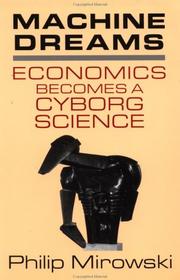
ISBN: 0521775264 0521772834 110771348X 1107710693 0511613369 9780521775267 9780511613364 9780521772839 Year: 2002 Publisher: Cambridge: Cambridge university press,
Abstract | Keywords | Export | Availability | Bookmark
 Loading...
Loading...Choose an application
- Reference Manager
- EndNote
- RefWorks (Direct export to RefWorks)
This was the first cross-over book into the history of science written by an historian of economics. It shows how 'history of technology' can be integrated with the history of economic ideas. The analysis combines Cold War history with the history of postwar economics in America and later elsewhere, revealing that the Pax Americana had much to do with abstruse and formal doctrines such as linear programming and game theory. It links the literature on 'cyborg' to economics, an element missing in literature to date. The treatment further calls into question the idea that economics has been immune to postmodern currents, arguing that neoclassical economics has participated in the deconstruction of the integral 'self'. Finally, it argues for an alliance of computational and institutional themes, and challenges the widespread impression that there is nothing else besides American neoclassical economic theory left standing after the demise of Marxism.
Methodology of economics --- Economic theory --- Economics --- Economie (Science) --- Economie (Wetenschap) --- Economische wetenschap --- Political economy --- Politieke economie --- Sciences économiques --- Cybernetics --- Economic history --- Technological innovations --- Computer science --- Economic aspects --- History --- Economics. --- History. --- 1945 --- -Computer science --- 20th century --- Business, Economy and Management --- Cybernetics - Economic aspects - History --- Economic history - 1945 --- -Technological innovations - Economic aspects - History - 20th century --- Computer science - History --- Informatics --- Science --- Breakthroughs, Technological --- Innovations, Industrial --- Innovations, Technological --- Technical innovations --- Technological breakthroughs --- Technological change --- Creative ability in technology --- Inventions --- Domestication of technology --- Innovation relay centers --- Research, Industrial --- Technology transfer --- Mechanical brains --- Control theory --- Electronics --- System theory --- Social sciences --- Economic man
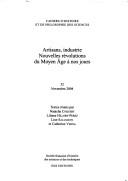
ISBN: 2847880518 9782847880519 Year: 2004 Volume: 52 Publisher: Paris: École normale supérieure,
Abstract | Keywords | Export | Availability | Bookmark
 Loading...
Loading...Choose an application
- Reference Manager
- EndNote
- RefWorks (Direct export to RefWorks)
Ce volume rassemble les actes d’un colloque tenu au Conservatoire national des arts et métiers et à la Cité des sciences et de l’industrie en 2001. Les discontinuités techniques examinées à la lumière de la notion de « révolution industrielle » en constituent le sujet central. Les auteurs, convaincus de la diversité des expériences en Europe et dans les mondes extra-européens, proposent de faire un nouvel usage de la notion de « révolution industrielle ». Loin de réduire le changement technique au front étroit des secteurs pionniers et de la grande industrie, ils mettent l’accent sur la pluralité des modes de production, sur les relations dialectiques nouées entre les générations techniques et sur la multiplicité des formes de l’innovation. L’artisanat, longtemps relégué dans la routine et le passéisme, apparaît riche de ressources. Ces études offrent une vision différenciée et non finaliste des processus d’intensification technique. L’échelle chronologique est celle des longues durées, du Moyen Âge à l’époque contemporaine. Dans leurs approches spatiales, les auteurs ont privilégié les changements d’échelle et les comparaisons. Par leur relecture du concept de « révolution industrielle », les historiens des techniques apportent ainsi une contribution majeure à la discipline historique dans son ensemble.
Manufacturing technologies --- History --- Economic history --- Economische geschiedenis --- Geschiedenis [Economische ] --- Histoire économique --- History [Economic ] --- Handicraft --- Modern period, 1500 --- -Industry --- Révolution industrielle --- Industrie --- Artisans --- Technique --- Technique et civilisation --- Métiers --- Histoire --- Histoire. --- Artisans - History - Congresses --- Industrial revolution - History - Congresses --- Industrialization - History - Congresses --- Technology and civilization - History - Congresses --- Technological innovations - Economic aspects - History - Congresses --- Révolution industrielle - Histoire - Congrès --- Industrialisation - Histoire - Congrès --- Innovations - Aspect économique - Histoire - Congrès --- Artisans - Histoire - Congrès --- Technologie et civilisation - Histoire - Congrès --- Industrial revolution --- Industrialization --- Technology and civilization --- Technological innovations --- Industrialisation --- Innovations --- Technologie et civilisation --- Industries --- Technology --- Industrial arts --- Technologie --- History.

ISBN: 1283316900 9786613316905 1400829437 9781400829439 0691120137 9780691120133 0691094837 9780691094830 Year: 2011 Publisher: Princeton, NJ : Princeton University Press,
Abstract | Keywords | Export | Availability | Bookmark
 Loading...
Loading...Choose an application
- Reference Manager
- EndNote
- RefWorks (Direct export to RefWorks)
The growth of technological and scientific knowledge in the past two centuries has been the overriding dynamic element in the economic and social history of the world. Its result is now often called the knowledge economy. But what are the historical origins of this revolution and what have been its mechanisms? In The Gifts of Athena, Joel Mokyr constructs an original framework to analyze the concept of "useful" knowledge. He argues that the growth explosion in the modern West in the past two centuries was driven not just by the appearance of new technological ideas but also by the improved access to these ideas in society at large--as made possible by social networks comprising universities, publishers, professional sciences, and kindred institutions. Through a wealth of historical evidence set in clear and lively prose, he shows that changes in the intellectual and social environment and the institutional background in which knowledge was generated and disseminated brought about the Industrial Revolution, followed by sustained economic growth and continuing technological change. Mokyr draws a link between intellectual forces such as the European enlightenment and subsequent economic changes of the nineteenth century, and follows their development into the twentieth century. He further explores some of the key implications of the knowledge revolution. Among these is the rise and fall of the "factory system" as an organizing principle of modern economic organization. He analyzes the impact of this revolution on information technology and communications as well as on the public's state of health and the structure of households. By examining the social and political roots of resistance to new knowledge, Mokyr also links growth in knowledge to political economy and connects the economic history of technology to the New Institutional Economics. The Gifts of Athena provides crucial insights into a matter of fundamental concern to a range of disciplines including economics, economic history, political economy, the history of technology, and the history of science.
Economic development --- Technological innovations --- History. --- Economic aspects --- Knowledge economy. --- Economy of knowledge --- Information economy --- KBE (Knowledge-based economy) --- Knowledge-based economy --- Economics --- Economic aspects&delete& --- History --- E-books --- Breakthroughs, Technological --- Innovations, Industrial --- Innovations, Technological --- Technical innovations --- Technological breakthroughs --- Technological change --- Creative ability in technology --- Inventions --- Domestication of technology --- Innovation relay centers --- Research, Industrial --- Technology transfer --- 338 <09> --- Economische geschiedenis --- Knowledge economy --- 338.064 --- 331.100 --- AA / International- internationaal --- Economische geschiedenis: algemeenheden --- 338 <09> Economische geschiedenis --- Intellectual life --- Innovations --- Développement économique --- Vie intellectuelle --- Aspect économique --- Histoire --- World history --- TECHNOLOGICAL INNOVATIONS -- 930.33 --- TECHNOLOGY -- 930.33 --- KNOWLEDGE ECONOMY -- 930.33 --- Technological innovations - Economic aspects - History --- Economic development - History
Book
ISBN: 2262003467 9782262003463 Year: 1985 Publisher: Paris: Perrin,
Abstract | Keywords | Export | Availability | Bookmark
 Loading...
Loading...Choose an application
- Reference Manager
- EndNote
- RefWorks (Direct export to RefWorks)
Technological innovations --- Capitalism --- Economic aspects --- History --- -Capitalism --- -AA / International- internationaal --- 331.100 --- 331.01 --- 331.12 --- 330.52 --- 338.043 --- Breakthroughs, Technological --- Innovations, Industrial --- Innovations, Technological --- Technical innovations --- Technological breakthroughs --- Technological change --- Creative ability in technology --- Inventions --- Domestication of technology --- Innovation relay centers --- Research, Industrial --- Technology transfer --- Market economy --- Economics --- Profit --- Capital --- -History --- Economische geschiedenis: algemeenheden. --- Evolutie van de economische cycli. --- Geschiedenis van de industrie. --- Liberaal systeem. Neo-liberalisme. Theorie van de onderhandeling. --- Technologische vooruitgang. Automatisering. Computers. Werkgelegenheid en informatica. --- AA / International- internationaal --- Economic aspects&delete& --- Liberaal systeem. Neo-liberalisme. Theorie van de onderhandeling --- Evolutie van de economische cycli --- Economische geschiedenis: algemeenheden --- Geschiedenis van de industrie --- Technologische vooruitgang. Automatisering. Computers. Werkgelegenheid en informatica --- Technological innovations - Economic aspects - History --- Capitalism - History --- HISTOIRE ECONOMIQUE --- HISTORIOGRAPHIE --- TECHNOLOGIE --- ASPECT SOCIAL
| Listing 1 - 10 of 12 | << page >> |
Sort by
|

 Search
Search Feedback
Feedback About UniCat
About UniCat  Help
Help News
News